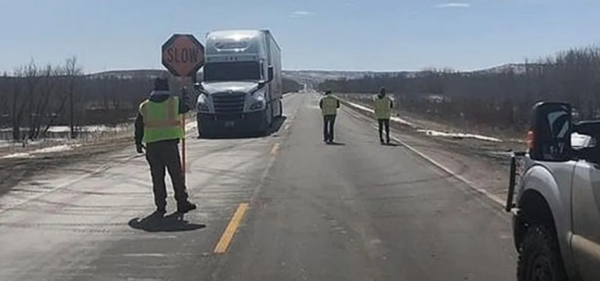
- Details
- By Native News Online Staff
PIERRE, S.D. — The tribal checkpoint saga in South Dakota continues, three days after the deadline imposed by South Dakota Governor Kristi Noem has passed.
On Tuesday, Cheyenne River Sioux Tribe Chairman Harold Frazier received a letter from Noem with a 3-point plan for removing or operating the checkpoints in a manner “that respects tribal sovereignty, federal law and state sovereignty as well.”
The first point calls for the removal of all checkpoints on U.S. and state highways. The second point allows the tribe to keep checkpoints on tribal and Bureau of Indian Affairs roads. The third point requires the checkpoints include access for emergency services, food deliveries, energy and medical supplies, and access to private property within the reservation.
Frazier did not formally respond to the Noem’s proposal on Tuesday but told Native News Online “it’s getting more ridiculous.”
On Wednesday afternoon, Frazier responded to Noem in a one-paragraph letter the said:
"Thank you for your letter we received yesterday offering comments on consultation for a potential 'pathway forward'regarding the CRST COVID-19 health safety checkpoints. We appreciate your concern about preventing the spread of the COVID-19 virus on the Cheyenne River Sioux Reservation and our taking action for the good of all people on the reservation. We will take your three-part plan into consideration. In the meantime, please forward any complaints you have received regarding the operation of our health safety checkpoints to the CRST COVID 19 Command Center."
Noem’s letter Tuesday is in sharp contrast to her hardline stance last Friday, when she sent Frazier and Oglala Sioux Tribe President Julian Bear Runner a letter demanding they close down 19 checkpoints on the Cheyenne River and Pine Ridge Indian reservations or face legal action if they were not removed within 48 hours, which was Sunday.
Noem said on Tuesday no legal action has been taken.
Both tribes have held firm in their argument they have the sovereign right to determine their own laws. Both tribes are committed to maintain the checkpoints as a means to curtail the spread of the deadly coronavirus onto their tribal lands.
Noem called the checkpoints a risk to spread the virus, without any evidence or rationale.
“Tribal interaction with these travelers at checkpoints is unlawful and could actually increase the risk of spreading the virus on the reservation,” Noem wrote.
While both tribes received letters from Noem last Friday, Frazier’s tribe was the only one to receive Noem’s proposal.
Meanwhile, the Oglala Sioux Tribe issued an emergency lockdown on the Pine Ridge Reservation until noon today, after announcing the first two positive cases of Covid-19 among tribal members yesterday.
More Stories Like This
Native News Weekly (August 25, 2024): D.C. BriefsUS Presidents in Their Own Words Concerning American Indians
Native News Weekly (December 14, 2025): D.C. Briefs
Wounded Knee Massacre Site Protection Bill Passes Congress
Two Murdered on Colville Indian Reservation
Help us defend tribal sovereignty.
At Native News Online, our mission is rooted in telling the stories that strengthen sovereignty and uplift Indigenous voices — not just at year’s end, but every single day.
Because of your generosity last year, we were able to keep our reporters on the ground in tribal communities, at national gatherings and in the halls of Congress — covering the issues that matter most to Indian Country: sovereignty, culture, education, health and economic opportunity.
That support sustained us through a tough year in 2025. Now, as we look to the year ahead, we need your help right now to ensure warrior journalism remains strong — reporting that defends tribal sovereignty, amplifies Native truth, and holds power accountable.
 The stakes couldn't be higher. Your support keeps Native voices heard, Native stories told and Native sovereignty defended.
The stakes couldn't be higher. Your support keeps Native voices heard, Native stories told and Native sovereignty defended.
Stand with Warrior Journalism today.
Levi Rickert (Potawatomi), Editor & Publisher

